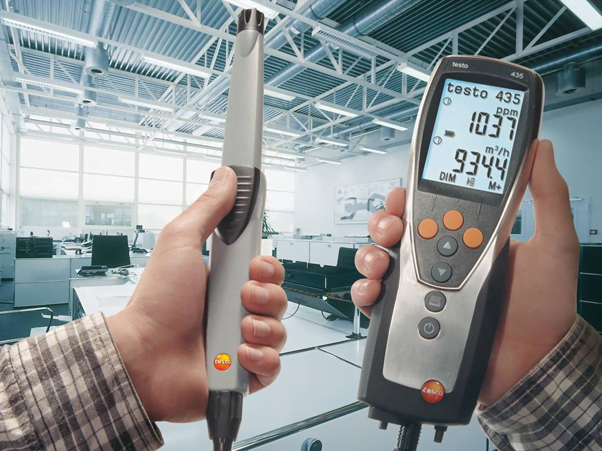





The term “indoor air quality” (IAQ) refers to the general term for the environmental features found inside buildings that may have an impact on occupant comfort, health, or productivity. We keep an eye on IAQ since we breathe “indoor air” for 90% of the time. Indoor air is constantly recycled, which traps and accumulates pollutants, in contrast to outdoor air. The amounts of contaminants in indoor air, along with the humidity and temperature of the air, are parameters of indoor air quality and we provide Architecture healthcare design

Anticipate to be astounded by the captivating realm of healthcare capital and life cycle costing assessments! These evaluations are critical in guaranteeing the operational effectiveness and financial viability of healthcare establishments.
In capital costing assessments, the initial expenses related to the procurement of assets, including but not limited to medical equipment, structures, or technology, are evaluated provide Architecture healthcare design. This evaluation assists healthcare organisations in making well-informed decisions regarding resource allocation, budgeting, and investments. Envision the remarkable undertaking of meticulously evaluating the financial ramifications associated with these pivotal investments!
However, there is more! Evaluations of life cycle costs elevate the situation to an entirely new level. They take into account maintenance, operation, and disposal expenses throughout the asset’s entire useful existence, in addition to the initial investment. This revolutionary methodology enables healthcare institutions to formulate enduring strategic choices that maximise assets while reducing expenditures and gives architecture healthcare design.
Within an industry characterised by financial constraints and a commitment to patient welfare, these evaluations function akin to intervention by superheroes. They empower healthcare providers to uphold fiscal responsibility while providing exceptional care.
Prepare yourself for an enlightening exploration of healthcare capital and life cycle costing assessments. Anticipate a profound impact of these financial assessments on the trajectory of our cherished healthcare systems.





As the healthcare industry evolves continuously, so too does the demand for novel approaches to performance enhancement. By improving patient care and streamlining processes, these solutions are fundamentally transforming the way in which healthcare professionals function.
Within this remarkable domain, healthcare performance enhancement solutions are facilitating the implementation of more streamlined and efficacious procedures. By leveraging state-of-the-art technologies and data-driven insights, healthcare providers are now capable of discerning areas that require enhancement and executing tactics to optimise overall performance.
Using advanced analytics to minimise medical errors and optimising workflow management systems are just two of the many domains that these solutions address. Through the implementation of data-driven strategies and the utilisation of technological advancements, healthcare organisations have the potential to attain substantial enhancements in patient outcomes, operational effectiveness, and cost-efficiency and Architecture healthcare design.
Consider a hypothetical scenario in which medical facilities effectively incorporate predictive analytics to forecast patient requirements, electronic health records (EHRs), and artificial intelligence (AI) algorithms to streamline resource allocation. As advancements persist in performance improvement solutions for healthcare, this magnificent vision is gradually materialising.
The ramifications of these solutions transcend individual patients and affect entire communities through the facilitation of proactive population health management. Through the identification of trends and patterns within extensive datasets, healthcare providers have the ability to formulate focused interventions that not only foster overall well-being but also proactively avert major illnesses.
As the trajectory of healthcare progresses, the transformative impact of performance enhancement solutions on an industry that impacts every individual is truly remarkable. With their assistance, we can anticipate a future in which high-quality healthcare is readily available, streamlined procedures are customary, and patient results soar to unprecedented levels.

In a healthcare environment that is perpetually changing, project implementations are vital to fostering innovation and enhancing patient care. The domain of healthcare project implementations is replete with innovative endeavours that are revolutionising our approach to medical services.
By integrating telemedicine platforms and implementing electronic health record systems, these initiatives are fundamentally transforming the manner in which healthcare practitioners provide their services. By leveraging cutting-edge technologies such as big data analytics, artificial intelligence, and machine learning, healthcare organisations are able to optimise operations, increase the precision of diagnoses, and enhance patient outcomes.
Healthcare project implementations comprise a diverse array of endeavours, including the establishment of intelligent medical facilities outfitted with Internet of Things (IoT) devices to enable real-time surveillance, the integration of cutting-edge medical devices to enhance diagnostic precision, and the utilisation of predictive analytics to identify patients at high risk and we give architecture healthcare design.
These remarkable initiatives are not only influencing the current state of affairs but also laying the foundation for a future in which precision medicine and treatments are standard practice. It is impossible to exaggerate the effect they have on enhancing patient experiences, decreasing expenses, and advancing health outcomes.
As we venture deeper into the intriguing realm of healthcare project implementations, we shall examine noteworthy case studies that underscore triumphant endeavours in diverse sectors such as electronic prescribing systems, hospital management systems, and telehealth solutions, among others. Anticipate to be astounded by the manner in which these initiatives are fundamentally transforming the healthcare delivery paradigm.





In the healthcare industry, the notion of performance verification is genuinely astounding. The process entails the thorough assessment and verification of the functionality of diverse healthcare systems, procedures, and technologies. This critical procedure guarantees that healthcare providers adhere to industry standards and deliver care of the highest quality.
Performance verification is an essential component in the advancement of healthcare outcomes and the improvement of patient protection. Through the validation of medical devices, treatment protocols, and clinical procedures, it provides healthcare professionals with the ability to discern truthful judgements that have a beneficial effect on patient care and architecture healthcare design.
In a time characterised by rapid developments in medical technology, performance verification is an indispensable instrument for ensuring that these innovations are dependable and produce the anticipated outcomes. It facilitates ongoing enhancement through the identification of areas that require optimisation and the resolution of any potential hazards or deficiencies.
It is impossible to exaggerate the importance of performance verification in the healthcare industry. This fosters a sense of assurance among both patients and healthcare providers, as it certifies that each facet of their treatment has undergone comprehensive quality assessment. As society progresses towards an innovative future, performance verification will remain a critical factor in influencing the development of contemporary healthcare.

In a healthcare environment that is perpetually changing, project implementations are vital to fostering innovation and enhancing patient care. The domain of healthcare project implementations is replete with innovative endeavours that are revolutionising our approach to medical services.
By integrating telemedicine platforms and implementing electronic health record systems, these initiatives are fundamentally transforming the manner in which healthcare practitioners provide their services. By leveraging cutting-edge technologies such as big data analytics, artificial intelligence, and machine learning, healthcare organisations are able to optimise operations, increase the precision of diagnoses, and enhance patient outcomes.
Healthcare project implementations comprise a diverse array of endeavours, including the establishment of intelligent medical facilities outfitted with Internet of Things (IoT) devices to enable real-time surveillance, the integration of cutting-edge medical devices to enhance diagnostic precision, and the utilisation of predictive analytics to identify patients at high risk.
These remarkable initiatives are not only influencing the current state of affairs but also laying the foundation for a future in which precision medicine and treatments are standard practice. It is impossible to exaggerate the effect they have on enhancing patient experiences, decreasing expenses, and advancing health outcomes.
As we venture deeper into the intriguing realm of healthcare project implementations, we shall examine noteworthy case studies that underscore triumphant endeavours in diverse sectors such as electronic prescribing systems, hospital management systems, and telehealth solutions, among others. Anticipate to be astounded by the manner in which these initiatives are fundamentally transforming the healthcare delivery paradigm.


Join the ranks of industry leaders who have discovered the power of our services!
With a track record of trust from over 25 industrial brands, our expertise speaks for itself.
WhatsApp us